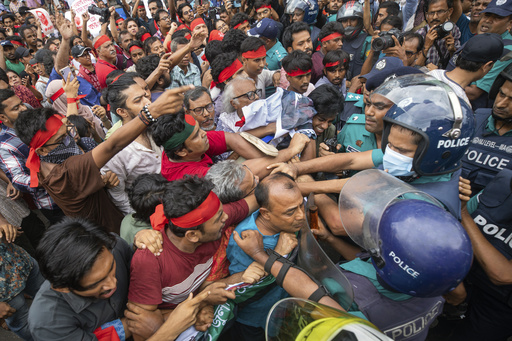Bangladesh has recently made a significant move by banning the Jamaat-e-Islami party, along with its student wing and affiliated organizations, labeling them as a “militant and terrorist” group. This decision comes in response to a series of violent protests that occurred over several weeks, resulting in over 200 deaths and thousands injured. Prime Minister Sheikh Hasina and her political allies have pointed fingers at the Jamaat-e-Islami and its associated factions for instigating violence during student demonstrations against a government job quota system. The Ministry of Home Affairs of Bangladesh officially announced the ban under an anti-terrorism law in a circular on Thursday.
Since July 15, the country has witnessed a death toll of at least 211 people, with over 10,000 arrests made nationwide. Bangladesh Jamaat-e-Islami had been forbidden from participating in national elections since 2014 after its registration was canceled by the Election Commission. The party was initially disqualified from elections in 2013 by the High Court, citing a violation of the national constitution due to its opposition to secularism. Despite these legal battles, the party was still allowed to carry out political activities such as meetings, rallies, and public statements.
Jamaat-e-Islami, founded during British colonial rule in 1941, took a controversial stance against the creation of Bangladesh as an independent state during the country’s war of independence from Pakistan in 1971. Many senior leaders of the party have faced legal consequences since 2013, being either executed or imprisoned for crimes against humanity committed during the war, including killings, abductions, and rapes. The party had organized militia groups to assist the Pakistani military during the nine-month conflict, which resulted in Bangladesh gaining independence on December 16, 1971, with support from neighboring India.
Historically, the Jamaat-e-Islami party had been banned after Bangladesh’s independence in 1971 due to its involvement in mass killings and atrocities under the leadership of Sheikh Mujibur Rahman, the nation’s founding leader and Prime Minister Hasina’s father. The ban was lifted in 1976, following Rahman’s assassination in a military coup that claimed the lives of most of his family members, leaving only Hasina and her younger sister Sheikh Rehana as survivors. While the Jamaat-e-Islami faced bans in Pakistan in 1959 and 1964 for similar reasons, it now grapples with a renewed prohibition in Bangladesh amidst ongoing political tensions.
The party has not yet issued a direct response to the latest ban, although its leader, Shafiqur Rahman, previously denounced any potential decision to outlaw the organization. Rahman emphasized the importance of upholding the laws and constitution of Bangladesh, warning against a dangerous precedent that could disrupt the country’s political stability if one party or alliance were to unduly influence the fate of another political entity.


